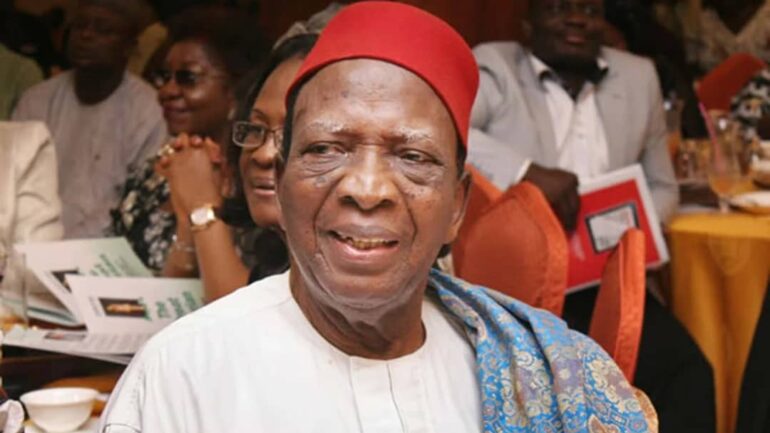With the transition of Professor Benjamin Obi Nwabueze at 94 on Sunday, October 29, 2023, Nigeria lost one of her most eminent jurists and nationalists. His death also constitutes a great loss to the legal profession and all those who were privileged to have encountered his warm and urbane personality. Under the heft of his deep legal mind, Professor Nwabueze was fondly referred as the “Professor of Professors” and was the first academic Senior Advocate of Nigeria.
He was erudite, courageous and cosmopolitan constitutional lawyer as well as an author of repute. Nwabueze had a legal and judicial career that spanned decades and at every turn, he has been distinguished and exceptional, exuding a genius that is intimidating in constitutional law. Professor Nwabueze was a moral giant and a powerful moral force to the campaign for democracy.
One of the major political developments and force that persuaded the military back to their barracks and saw the birth of the Third Republic. Above all, Professor Nwabueze was distinguished in many respects and was not just distinctly an academic and erudite constitutional lawyer, he was a Nigerian patriot, a man so committed to the ideal of a better society; and he led by example.
Professor Nwabueze was born on December 22, 1931 in Athani, Ogbaru Local Government Area of Anambra state. After attending CMS Central School in his home town for his primary education (1938-1945), he proceeded to CMS central school Onitsha for his secondary education from 1947-1950. In search of the proverbial golden fleece, Benjamin left Nigeria for the United Kingdom and attended the famed London School of Economics and Political Science, University of London between (1956-1961). But, Professor Nwabueze was not destined to be a political scientist or an economist. Unable to resist the lure for law, which was the favorite profession chosen by his peers at that time, he continued his studies at the School of Oriental and African studies in the same institution from (1961-1962).
He was senior lecturer at Holborn College of Law, London from 1962-1965). He returned to Nigeria to teach at the University of Nigeria Nsukka from 1967 to1970. Expectedly, as a legal icon, his wealth of knowledge in law saw him impacting legal knowledge outside the shores of the country as he traversed around Africa doing what he knows best: teaching law. In 1971, he became Dean, Faculty of Law, University of Zambia and Director Law practice Institute, Zambia, from (1973-1975).
His academic prowess and authorship did not only earn him Doctor of Laws (LLD) at the University of London in 1978 based on his three outstanding books, Constitutionalism, Presidentialism, and Judicialism, it also made him enter the record books as the second Nigerian and African holder of a higher doctorate degree in Law by published works after Dr. Teslim O. Elias. Professor Nwabueze will be remembered as the first academic lawyer in Nigeria to be made SAN in 1978. He was a member of Senate of the University of Lagos as well as the Universities of Dar-es-Salem, Nairobi, Haile Selassie in Ethiopia, Lesotho, Botswana and Swaziland between 1971-1978.
Between 1978-1979, he was appointed University assessor for academic appointments in Universities of Ghana, Lagos, Ife (now Obafemi Awolowo University) and Jos respectively. He had a stint in the banking industry as secretary/Legal adviser, United Bank for Africa from 1976-1980.In 1993. He was appointed Minister of education, a position he held for just eight months.
Professor Nwabueze belonged to a generation of those devoted to democratic principles which they pursed rigoriously. He was part of a group known as Constitutional Committee for Nigeria 1986 and the Constitutional Drafting Committee that produced the nations’ Constitution. He was quoted to have said, “I drafted the whole of chapter two of the Constitution in my house”. He was a member of the Constitutional Drafting Committee for Zambia in 1973 and Constitutional adviser to the Kenyan government in 1992 which saw the country move from a one-party system to a multiparty democracy. Nwabueze was also a key member of Patriots, described as a conglomeration of ethnic-intellectuals and politicians, under the headship of the late Chief F.R.A. Williams (SAN) The association regularly gave independent advice and admonitions to government on thorny legal, constitutional and socio-political issues.
Principled, fair-minded and with cosmopolitan outlook, Professor Nwabueze leveraged academia for Africa. While he represented a strong advocate for Ndigbo’s cause around the world. He co-founded Ohaneze Ndigbo in 1976 with like minds such as, Akanu Ibiam, M I Okpara, K O Mbadiwe, Chief Ogochukwu, P N Okigbo and Udoji.
He was an active leader and pioneer secretary-General of Ohanaeze Ndigbo worldwide, a platform used to articulate the interest of the Igbo in the Nigerian polity. Like all great men, Professor Nwabueze was not completely without human foibles. He had become a dreamer, too trusting in seeing a unified country in the tenor of governance through the eye of the Constitution of he was a part.
But one thing was clear, although he had strong beliefs and uncommon knowledge of Constitutional Law, he was honest enough to admit that they, (Constitutional Committee Members) were misguided by the absolute devolution of powers the constitution gave to the centre (Federal Government).
He said, “We were misguided, and that is the truth. In a number of public statements, I have frankly admitted that we were misguided, that we were guided by the feelings at the time in the country”. Despite that seeming failing, he remained genuine at heart, undauntingly hopeful in redeeming the country through his strong, persistent advocacy of good constitutional governance, restructuring and rewrite of the Constitution. With the demise of Professor Benjamin Obi Nwabueze at a period the country is in dire need of socio-political and constitutional stability, Nigeria has lost one of the few remaining strong personalities, patriot and constitutional thinker of our time.

